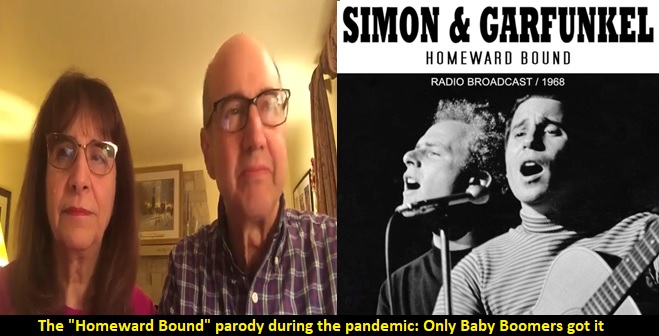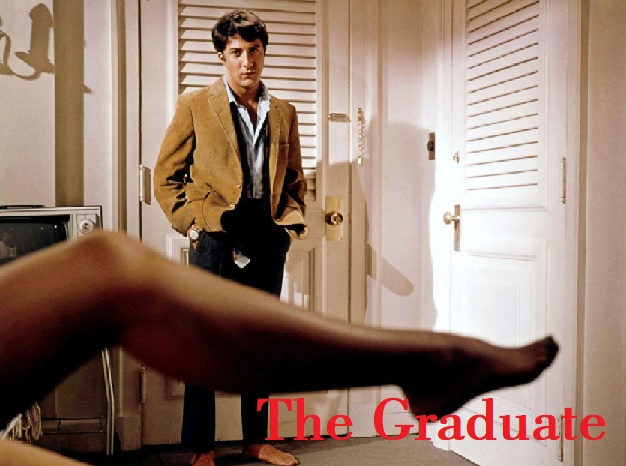The “ ‘We’re All Home Bound’ – the Coronavirus song” by Mel and Claire Vatz, from Pittsburgh, which was published on Youtube on Michael Moore’s Youtube channel during the Coronavirus pandemic was tremendously funny. If you have not seen it, click on this link https://youtu.be/yFfCz-WGEgg?si=1PquOg9xXAeAByeD to go to Youtube and see it. It is tremendously funny. Many people loved it; however, in order to appreciate the humor in Mel and Claire Vatz’ “Homeward Bound” you needed to be a baby boomer who loved Simon and Garfunkel’s original 1966 Homeward Bound song. If you wish to relive the original Simon and Garfunkel song, click on this Youtube link https://youtu.be/HAnj2fyjxRw?si=o69nvcc4_r-KVPlU so you can travel back and live the moments when you first heard this wonderful song.
“We’re All Home Bound” is a poignant yet humorously crafted parody of Simon and Garfunkel’s iconic song “Homeward Bound,” reimagined by Mel and Claire Vatz from Pittsburgh during the coronavirus pandemic. Published on Michael Moore’s YouTube channel, this creative adaptation resonates deeply with a global audience experiencing the trials and tribulations of lockdowns, social distancing, and the overarching theme of yearning for normalcy in unprecedented times. The Vatzs’ rendition not only captures the essence of the original song’s melancholy and longing for home but also cleverly repurposes it to reflect the shared experiences of millions confined to their homes during the pandemic. But you had to be a baby boomer from the 60s to know Simon and Garfunkel’s song and thus understand that this was a parody of that wonderful, iconic song.
Simon and Garfunkel’s “Homeward Bound” originally spoke to the feelings of displacement and the desire to return to the familiarity and comfort of home. In the hands of Mel and Claire Vatz, these themes are transformed to articulate the collective longing for the end of the pandemic and a return to a world where freedom and social interaction are once again taken for granted. The song becomes a vessel for expressing the frustrations, fears, and the occasional comedic relief found in the day-to-day realities of living through a global health crisis.
The Vatzs’ parody, “We’re All Home Bound,” succeeds in striking a delicate balance between humor and sensitivity. It acknowledges the gravity of the situation while also providing a much-needed comedic outlet for those struggling with the monotony and isolation of lockdown life. By doing so, it offers a form of cathartic release, allowing listeners to laugh at their shared predicaments, from the trivialities of Zoom fatigue and baking sourdough bread to the more serious concerns of health and wellbeing.
Lyrically, the song adeptly uses satire to shine a light on the quirks of pandemic life. It touches on the absurdity of hoarding toilet paper, the newfound prevalence of virtual meetings, and the strange reality of celebrating milestones in isolation. These lyrics, set to the familiar and comforting tune of “Homeward Bound,” not only entertain but also foster a sense of unity among listeners. The song implies that while we may be physically separated, we are all navigating this strange new world together.
The choice of Michael Moore’s YouTube channel as the platform for this parody’s release underscores the song’s intent to reach a wide and diverse audience. Moore, known for his documentary filmmaking that often critiques social, economic, and political issues, provides a fitting backdrop for a song that comments on the societal impacts of the coronavirus pandemic. This strategic decision amplifies the song’s message, ensuring it resonates with individuals who are both directly and indirectly affected by the pandemic’s far-reaching consequences.
In essence, “We’re All Home Bound” is more than just a parody; it is a reflection of the human condition in times of crisis. It encapsulates the anxiety, the monotony, and the surreal nature of pandemic life, but also highlights the resilience of the human spirit. Through humor and music, Mel and Claire Vatz offer a reminder that even in the darkest of times, there can be lightness and laughter. Their song stands as a testament to the power of art to unite, to heal, and to provide solace, serving as a musical beacon of hope for a world eagerly awaiting the chance to say, “We’re no longer bound; we’re free.”


